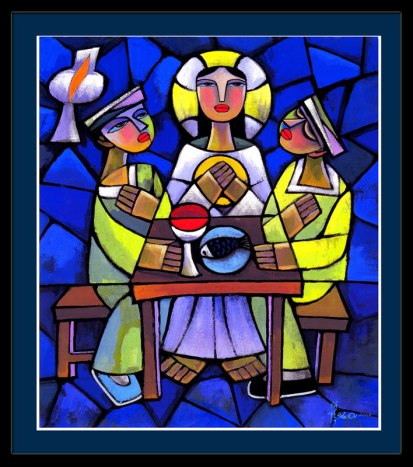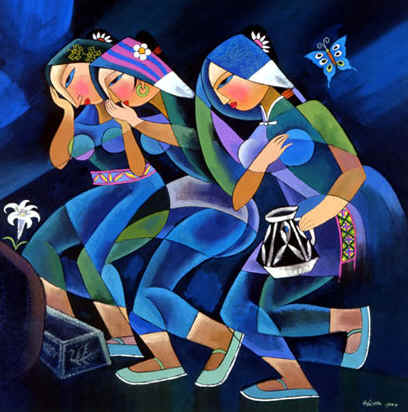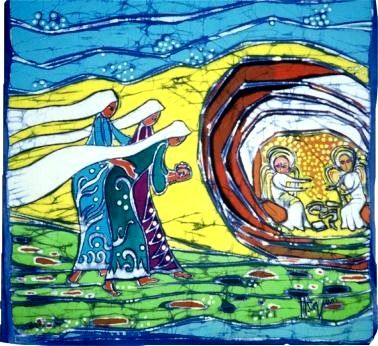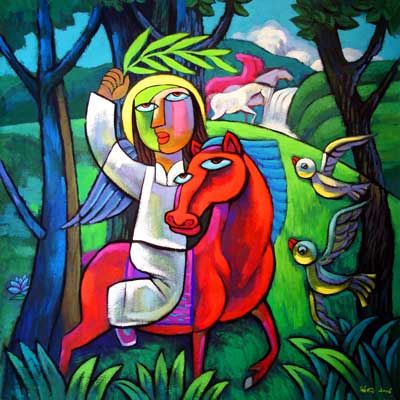Pastor Hazel Joyce Salatan, Asociation of Women in Theology (AWIT)

Supper at Emmaus by He Qi https://revfranmusings.blogspot.com/2018/04/resurrection-doubt-resurrection-hope.html
Awit 16: 1-2, 5, 7-11
Mga Gawa 2:14, 22-28
1Pedro 1:17-21
Lucas 24:13-35
Sumabay si Hesus sa dalawang alagad patungong Emaus. Hindi nila nakilala si Hesus habang sila ay naglalakbay. Nang gawin ni Hesus ang paghahati-hati sa tinapay at nagpasalamat sa Diyos, nabuksan ang kanilang mga mata at nakilala siya.
Nakilala si Hesus sa kanyang gawa at hindi sa kanyang mukha. Napagtanto nila ang kanyang sinasabi ng sila’y naglalakbay. Naramdaman nila ang nag-uumapaw na pakiramdam habang sila ay kinakausap. Isang estranghero ang nagbukas sa mata ng dalawang alagad.
Sa pagpasok ng taong 2020, naranasan ang dalawang disaster . Ang pagsabog ng bulkang Taal at ang pandemikong COVID-19. Parehas na nakapinsala sa buhay at kabuhayan ng marami. Nasaksihan natin ang iba’t ibang kwento ng mamamayan at mula rito ay nabuksan ang ating mga mata sa kalagayan ng bansa.
Tunay na kahanga-hanga ang mga mamamayang Pilipino sa anumang pagsubok ng buhay. Maraming pagkakataong napatunayan ang angking katatagan at kalakasan. Nasaksihan din ang pagiging mapagmalasakit, mapagkalinga, at mapagmahal sa kapwa. Hindi rin matatawaran ang pagkilos ng mga mamamayan tungo sa isang lipunang payapa at makatarungan na tinitiyak na ito ay mararanasan ng lahat. Sa pagharap ng bagong pagsubok, ang bawat isa ay may katangi-tanging paraan upang kayanin at malagpasan ito.
Bahagi ng kulturang Pilipino ang pagsasalu-salo kung saan naipapamalas ang mga katangiang bukod-tangi. Ang kumustahan, kwentuhan at halakhakan ang higit pang nagbibigay ng kasiglahan sa bawat pagtitipon. Sa ating kasalukuyang kalagayan, matatagalan muli ito bago mangyari.
Ngunit, malikhain ang mga Pilipino at nakagagawa ito ng mga paraan upang mabigyan-daan ang kulturang likas sakanya. Sa gitna ng panganib dulot ng krisis sa medikal ay naipapamalas pa rin nito ang kanyang kakayahan na tumugon sa pangangailangan ng kanyang kapwa.
Sa paglalakbay na ito, marami tayong estrangherong nakasasabay. Tayo ay nagiging mulat sa kalagayan ng ating mga kapwa sa pamamagitan ng kanilang mga kalagayan at sa kanilang gawa. Bagamat pinalalaganap ng di makatarungang sistema ang pagiging makasarili ay unti-unti natin itong naiigpawan at piniling maunawaan natin ang kalagayan sa pamamagitan ng pagiging lubog sa situwasyon ng ating mga kapwa at nakikisangkot sa paglaban ng karapatan para sa isang buhay na ganap (Juan 10:10).
Tayo ay magkakasama sa hakbang-hakbang na paghahanda ng ating mga sarili upang maging lubos ang ating pakikiisa at maging ganap ang ating pagtugon sa bayan ng Diyos.
Ngayong, tayo ay humaharap sa isang sakuna, marami tayong estrangherong nakakasabay, maraming Hesus tayong nakikilala. Nakilala natin sila hindi dahil sa kanilang mga pisikl n wangis kundi sa kanilang kalagayan, pamumuhay, at kanilang ginagawa.
Ang mga doktor, nars at ang iba pang tumatayong frontliners na nag-aalay ng kanilang buhay para malutas ang krisis sa medikal ay mga estrangherong hindi binibigyan ng tamang trato at pagkilala ng kinauukulan . Ngunit tiyak kong ang sambayanan ay may mataas ng pagkilala sa kanila at sa kanilang malaking nagawa at magagawa sa bayan. Idagdag pa, ang ating pagpupugay sa kanilang hanay na mga lumisan habang tinitiyak ang kaligtasan ng marami.
Hindi din naman maikakaila ang pagkakaroon natin ng kamalayan sa kalagayan ng iba pang sektor ng lipunan.
Estranghero sa atin ang maraming mahihirap na komunidad sa bansa ngunit nadama natin ang kanilang pagtangis at tayo rin naman ang naging kasama nila sa pagtangis. At hindi nagtatapos sa pagtangis ang ating pagkilala sa kanila, bagkus maging sa kanilang pagtindig para sa kanilang karapatang magkaroong ng sapat na pagkain sa kanilang hapag.
Estranghero ang marami na namatay sa sakit ngunit tayo ay nakikidalamhati sa kanilang pamilya at mga kaibigan. Kaakibat ng ating pagdadalamhati ay ang ating pagkundena sa walang maayos na solusyong medikal sa halip ay nagbigay ang pamahalaan ng pagpapahalaga sa pagpapaigiting ng militarisasyon. Ito ay nagdulot ng takot at pangamba sa maraming Pilipino.
Estranghero din ang maraming organisasyon na kumikilos upang makatulong sa maraming kababayan nating naghihikaos gayundin ang pagbibigay ng mga pangangailangan ng mga frontliners. Hindi natin sila kilala ngunit tayo ay hangang-hanga sakanila. Sa kabila ng madaming diskriminasyon at pang-iipit sa ibang mga organisasyon na tumutulong ay patuloy na nagsusumikap na gawin ang tama, ang tumulong sa kapwa.
Estranghero din sa atin ang nararanasan ng mga kapatid nating People Living with HIV (PLHIV) sa gitna ng pandemiko. Naging doble ang hirap na kanilang nararanasan. Ang iba nga ay hindi ligtas na espasyo ang kanilang tahanan.
Ang kalagayan ng maraming magsasaka din ay nahihirapan sa paglikha ng produkto dahil sa limitasyon dulot ng mga panukala ng pamahalaan. Maging ang mga mangingisda ay nagkakasya sa luging presyo ng mga huling isda. Naging mabigat din ang higit isang buwan na tigil sa paggawa ng mga manggagawa.
Marami pang mga kwento ng paglalakbay ang hindi natin nalalaman. Marami tayong nakakakasabay na hindi natin nabibigyan ng pansin. Maraming mga pahayag at panawagan na nagpaumapaw ng ating nararamdaman ngunit kadalasan hindi natin maunawaan.
Sa pinagsama-samang lakas, karanasan, at kamalayan ay naging mulat tayo sa katotohanan. Naunawaan natin na ang nag-uumapaw nating nararamdaman para sa mga estranghero ay dahil sa nais nating makatugon at maging kabahagi ng malaking pagkilos tungo sa isang lipunang mulat sa katotohanan.
Namumulat tayo sa katotohanan upang isiwalat din ang katotohanan katulad ng mga alagad na bumalik ng Herusalem at patotohanan ang muling pagkabuhay ni Hesus. Namumulat tayo sa katotohanan upang tayo ay tumugon sa hamon.
Kung atin ng makakamit ang antas ng kamalayan kung saan ating kinikilala, binigyang halaga at tayo’y pumapanig sa pinaka-aba, pinaka-api at kinalimutan ng lipunan – ang ating mga itinuturing na mga estranghero ay silang magbibigay sa atin ng mga konkretong pagsasalarawan ng paghahati ng tinapay at pagpapasalamat sa Diyos na magbubukas ng ating mga mata. ##





